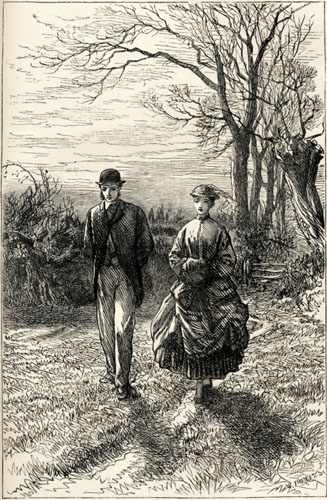Spiritual Sunday
In today’s Episcopal service we encounter a passage from St. Paul’s letter to the Romans that I particularly like, in large part because it captures an internal conflict that we can all relate to. It also reminds me of a passage from Anthony Trollope’s The Last Chronicle of Barset (1867).
First, here’s St. Paul talking about his internal battle with sin:
I do not understand my own actions. For I do not do what I want, but I do the very thing I hate. Now if I do what I do not want, I agree that the law is good. But in fact it is no longer I that do it, but sin that dwells within me. For I know that nothing good dwells within me, that is, in my flesh. I can will what is right, but I cannot do it. For I do not do the good I want, but the evil I do not want is what I do. Now if I do what I do not want, it is no longer I that do it, but sin that dwells within me.
So I find it to be a law that when I want to do what is good, evil lies close at hand. For I delight in the law of God in my inmost self, but I see in my members another law at war with the law of my mind, making me captive to the law of sin that dwells in my members. Wretched man that I am! Who will rescue me from this body of death? Thanks be to God through Jesus Christ our Lord! (Romans 7:15-25a)
In the Trollope novel, a young man, John Eames, wants to marry Lily Dale, but she repeatedly turns him down. He resolves to always be true to her, even if she never accepts him, but in the meantime he also decides to amuse himself (innocently, he tells himself) with another woman. Note the Pauline conflict about wanting to do what is good while succumbing to “sin that dwells within me”:
He got into a cab, and bid the cabman drive hard, and lighting a cigar, began to inquire of himself whether it was well for him to hurry away from the presence of Lily Dale to that of Madalina Demolines. He felt that he was half-ashamed of what he was doing. Though he declared to himself over and over again that he never had said a word, and never intended to say a word, to Madalina, which all the world might not hear, yet he knew that he was doing amiss. He was doing amiss, and half repented it, and yet he was half proud of it. He was most anxious to be able to give himself credit for his constancy to Lily Dale; to be able to feel that he was steadfast in his passion; and yet he liked the idea of amusing himself with his Bayswater romance, as he would call it, and was not without something of conceit as he thought of the progress he had made in it. “Love is one thing and amusement is another,” he said to himself as he puffed the cigar-smoke out of his mouth; and in his heart he was proud of his own capacity for enjoyment. He thought it a fine thing, although at the same moment he knew it to be an evil thing—this hurrying away from the young lady whom he really loved to another as to whom he thought it very likely that he should be called upon to pretend to love her. And he sang a little song as he went, “If she be not fair for me, what care I how fair she be.” That was intended to apply to Lily, and was used as an excuse for his fickleness in going to Miss Demolines.
It’s another example, if another example is needed, that literature provides lots of material for moral instruction.


